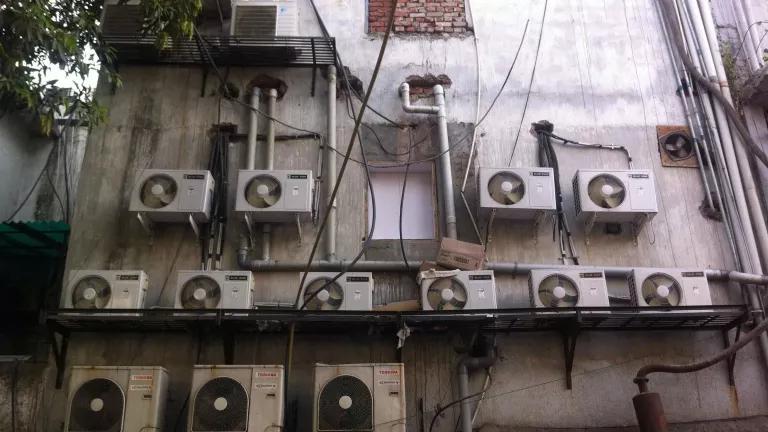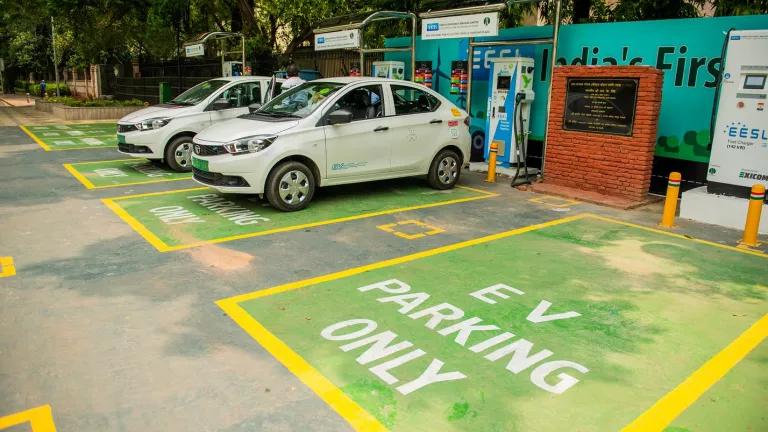Cooling with Less Warming: Fighting Global Superpollutants
Read about the upcoming Montreal Protocol meeting and the progress countries have made since signing the Kigali Amendment.

Air Conditioners in New Delhi, India
Countries are gearing up to address the climate crisis at the 33rd Meeting of the Parties (MOP33) to the Montreal Protocol next week and the climate summit COP26 in Glasgow later in November. Exactly five years ago, in 2016, countries agreed to the Kigali Amendment to the Montreal Protocol to phase down hydrofluorocarbons (HFCs)—global superpollutants. The agenda for the virtual MOP33 is streamlined, along with an NRDC side event, Cooling With Less Warming: Opportunities from Kigali Amendment Implementation in India.
HFCs, used in air conditioners (ACs), refrigerators, and other applications, are greenhouse gases (GHGs) with thousands of times the warming potent of carbon dioxide (CO2). The Kigali Amendment will avoid the use of HFCs equivalent of more than 70 billion tons of CO2 over the next 35 years, achieving a nearly 90% reduction in global warming resulting from unconstrained HFC use by the end of the century. Given the warming planet and the rising need for cooling, it is critical that countries are successful implementing the Kigali Amendment to phase down HFCs and improve air conditioning energy efficiency.
In big news, the three countries largely responsible for the production and consumption of HFCs—the U.S., China, and India—have moved forward with adopting the Kigali Amendment into domestic law. In total, 127 nations have ratified the Kigali Amendment.
India and China both ratified the Kigali Amendment this summer. Ratification is a strong signal to industry and other nations that countries are serious about phasing down HFCs and energy efficiency. The India Cooling Action Plan (ICAP) released in 2019 supports India’s recent ratification with a path for implementation. In the U.S., the Environmental Protection Agency (EPA) finalized an important rule last month to phase down the supply of HFCs. The benefits of the new rule are huge, and it is a significant step toward President Biden’s goal of cutting climate pollution by 50 to 52 percent by the end of this decade.
What to Expect at MOP33
MOP33 discussions will focus on how switching refrigerants presents an opportunity to simultaneously upgrade designs and components to make appliances more efficient. Discussions will encourage countries to adopt a fast-mover status with regulations for hydrochlorofluorocarbons (HCFCs) and HFC phase down with progressive energy efficiency improvements. A draft decision on energy efficiency submitted by the U.K. is also likely to be discussed. Countries will continue reviewing the progress on capturing and controlling the unexpected emissions of trichlorofluoromethane (CFC-11) and financing global atmospheric monitoring. The meeting will review energy efficiency and low-global-warming-potential technologies, based on a report prepared by the Technology and Economic Assessment Panel.
The virtual discussions will also cover the replenishment of the treaty’s funding arm, the Multilateral Fund (MLF). Countries will discuss potential funding estimates, but have decided to postpone a final decision on the amount of the replenishment until they can meet in person. An interim budget is available for existing funds.
Key Side Events at MOP33
MOP33 will have a series of side events bringing together experts from civil society groups, academic institutions, industry and government on emerging issues related to the Montreal Protocol.
NRDC is hosting a side event, Cooling With Less Warming: Opportunities from Kigali Amendment Implementation in India, on October 27, 2021, 19:00-20:00 (EAT) Nairobi, 12:00 – 13:00 Eastern U.S., 21:30 -22:30 IST. As India begins developing a national strategy for phasing down HFCs, to be concluded by 2023, the time is ripe to discuss opportunities to maximize gains from the phase down.
Key Speakers:
- Joint Secretary Jigmet Takpa, Ministry of Environment, Forest & Climate Change;
- Sec R.R. Rashmi, The Energy and Resources Institute
- Alex Hillbrand, HFC Expert, Climate & Clean Energy Program, NRDC
- David Doniger, Senior Strategic Director, Climate & Clean Energy Program, NRDC
- Prima Madan, Sustainable Cooling Expert Consultant, India Program, NRDC
- Abhijit Acharekar, General Manager (R&D), Godrej & Boyce
- Kanwal Jeet Jawa, Chairman and Managing Director, Daikin India
- Shikha Bhasin, Senior Programme Lead, Council on Energy, Environment & Water
- Dr. Stephen Anderson, Director of Research, Institute for Governance & Sustainable Development
NRDC’s Prima Madan will join the discussions at a side event hosted by the Council on Energy, Environment and Water, on How the AC Servicing Sector can Leverage Technology Improvements to Achieve Jobs Growth and Sustainability, on October 26, 2021, 2:30-3:30 PM IST. The discussion will include aspects of technology transitions in the cooling sector and opportunities for the servicing sector and technicians.
In the five years since the signing of the Kigali Amendment, countries are moving forward with action to phase down HFCs and improve the efficiency of air conditioners. The Montreal Protocol continues to be a model for global cooperation and offers useful lessons to the countries meeting for the climate talks in Glasgow.

Looking back: NRDC team at Montreal Protocol Meeting in Kigali 2016, David Doniger, Alex Hillbrand, Anjali Jaiswal, Bhaskar Deol, and Nehmat Kaur.



